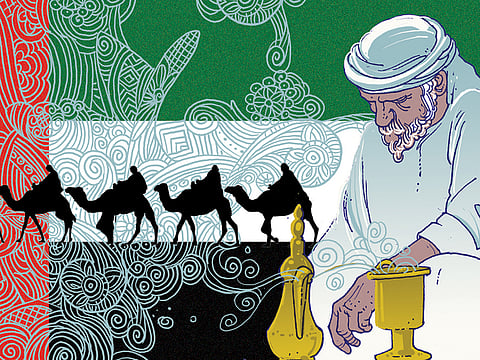Preserving UAE’s oral history
The stories and tales told by senior citizens to their sons and daughters have a historical importance. If these memories are not collected and preserved, they will disappear forever

Throughout history, old people used to pass on their stories, testimonies and experiences to the younger generations as a means to preserve their cultural heritage. In the UAE, older people are the nation’s treasured assets due to their rich memories chronicling the tales of our grandfathers and ancestors.
The death of an older man is like the loss of a treasure chest of memories. Since oral history is the systematic collection of living people’s testimony about their own experiences, losing older people negatively affects different aspects of life, notably the national oral history. The stories and tales told by senior citizens to their sons and daughters have historical importance. If these memories are not collected and preserved, they will disappear forever.
This shows how important writing our history is. It is vital for young Emiratis to listen to stories narrated by the elderly in order to be able to write down our national oral history. The elderly are the only ones in the UAE who play the role of narrators.
“When an old man dies, a library burns to the ground.” This old African proverb perfectly applies to the situation in the UAE, and raises a question as to how many libraries were burned to the ground in the UAE over the past 45 years, since the creation of the federal state?
Many elders have died and treasures of valuable information have disappeared with them. This makes one wonder why was it not possible for us to sit with those old people before they departed this world?
Of course, it was possible. This should have been done by assigning this as a national mission to an organisation run by specialised and qualified researchers with experience, who like their job and dedicate their time to doing it to perfection. A generous budget should be allocated for this institution as one of the most vital, strategic projects.
We hope to have an institution that looks like the Emirates Centre for Strategic Studies and Research in Abu Dhabi, which has become a milestone not only in the UAE, but also in the Arab world and the greater region.
The competition between institutions for the best is a creative, honourable one that benefits the nation and citizens, both present and future, before it benefits others in the Arab world. All this was possible earlier and it is also possible to make this a reality now as ‘better late than never’ goes the saying.
But, this needs a bold resolution. Our leaders and officials have often issued such bold resolutions without hesitation when it comes to matters of national history and its affairs — irrespective of the nature and size of these affairs.
Therefore, it is vital now to write down the country’s oral history in a scientifically accurate manner. This will help strengthen the UAE’s immunity against falsification of facts and twisting of reality to serve non-noble purposes. Writing an accurate history based on true information derived from genuine sources will not leave loopholes for anyone to misuse and attack it.
That is why it is so important to sit down with the older generation, listen to them carefully, record the conversations and then write them down. Later, these stories should be edited for clarity and to sieve the necessary information from them.
Some people may argue that there are national institutions dedicated to oral history in the UAE, where they release and distribute their publications. However, these publications are limited and target only those people who are interested. This simply means that the younger generation will not have access to these publications and the knowledge about the country’s rich heritage and history will remain unknown to them. And that will be a calamity.
The question that arises here is why take the UAE as an example in the context of this vital topic? The reason behind it is that it serves as a positive and great model in many areas. Secondly, the UAE has not been tapped into yet. No doubt, it is rich in history, culture and heritage where there is a story under each stone and thousands of tales in every nook and corner.
Just a quick review of titles published in the UAE will reveal that only a few books on the UAE’s history are published every year. Supported by figures, there are 1,200-1,500 titles printed and published in the UAE every year, with a few books on oral history that can benefit the present generation.
Among these useful books are titles that were authored by the late writer and researcher, Ahmad Rashid Thani. However, the most significant historical works are authored by His Highness Dr Shaikh Sultan Bin Mohammad Al Qasimi, Supreme Council Member and Ruler of Sharjah. These books are considered to be the most important references on the UAE and the greater Gulf Cooperation Council region due to their scientific value and their richness in terms of precision of information and knowledge, as well as their sources of information, style of writing and addressing historical issues.
If we fail to preserve and protect our oral history, we will have no connection with our past. In other words, we will kill our past. This reminds me of a famous saying by the author, Rasul Gamzatov: “If you fire at the past from a pistol, the future will shoot back from a cannon.”
Mohammad Hassan Al Harbi is a renowned columnist and author whose writings cover various fields ranging from media studies to education.
Sign up for the Daily Briefing
Get the latest news and updates straight to your inbox



